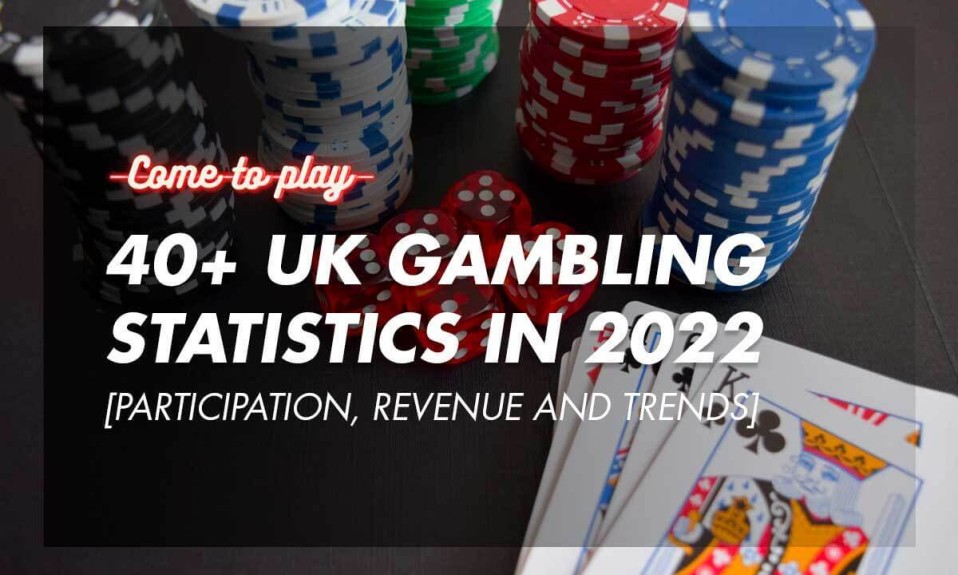If you’re eager to get the dice rolling, our gambling statistics in the UK will tell you everything you need to know about the gambling industry in the UK.
Let’s go all-in and find out!
Top 10 Gambling Statistics
- 45% of Britons gambled in some way every month
- There are over 1.4 million problem gamblers in the UK
- Only 3% of gambling addicts seek out for help
- There were 6,462 betting shops in the UK in 2021
- The GGY of the gambling industry was £12.7 billion in 2021
- 50% of online gamblers access UK gambling sites via smartphone
- Women tend to play the Lottery more
- The average slots session lasts 17 minutes
- The number of bets placed increased to 28 million in December 2021
- Males are more likely to self-exclude
Gambling Statistics in the UK
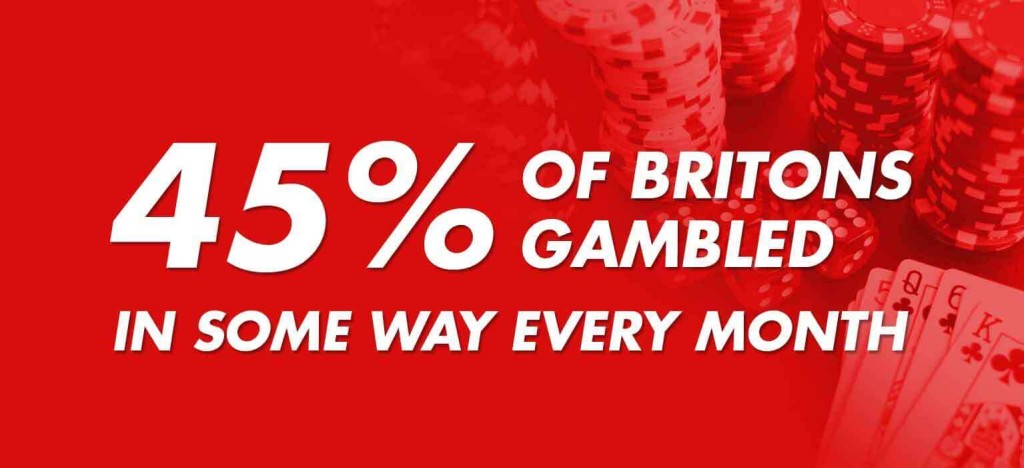
1. How many people gamble in the UK?
(European Business Review)
The latest gambling UK statistics indicate that 10.5 million (or almost half) of all gamblers resorted to betting online.
This means that just over 45% of Britons gambled in some way every month.
2. In 2021, participation in any gambling activity in December was at 43% compared to the same time in 2020.
(UK Gambling Commission)
This decline in the frequency of gambling is bad news for the nation’s casinos and may reduce revenue by between 4% and 10%.
According to our estimate, on an annualized basis, gamblers lost money at a rate of -3.7% in the year to Dec 2021 compared to the year to Dec 2020, which implies that people are losing more and more money.
3. 29.6% of casino gamblers thought they were profitable.
(Beating Betting)
Apparently, Brits have mastered the art of betting on sports as 35.3% of them consider themselves profitable.
However, judging by a UK gambling survey, regular players are more likely to think they turned a profit than those who participate in gambling occasionally.
Thus, 41.24% of all sports bettors who wager on a regular basis think they are profitable. Similarly, regular casino players are over two times more likely to think they made money from gambling than occasional players.
4. 31.2% of Britons aged 16 to 24 were gambling in 2020.
(Statista)
When it comes to what age group gambles the most, it’s UK residents aged 45 to 54 that come out on top—48.4% of respondents from this age group were gamblers. This generation is followed by 55-64-year olds (46.5%) and the 35-44 age bracket (45.8%).
5. Around 44.5% of men participated in one or more forms of gambling in 2020.
(Statista)
You don’t have to be a professional gambler to participate in any sort of gambling.
The gambling participation demographics show that in 2020, 39.8% of women in Britain participated in at least one type of gambling.
The men to women ratio has remained steady over the last three years; however, women’s participation in 2020 noted a decrease of 3.9% from 2019, when it stood at 43.5%.
Related: Is today your lucky day to gamble?
6. There are 8 defined gambling typologies.
(UK Gambling Commission)
According to the Gambling demographic statistics in 2022, the eight defined gambling typologies are:
- “Me Time”
- “Feeling Lucky”
- “Along for the ride”
- “For the money”
- “Money to burn”
- “Social play”
- “Just what I do”
- “Wise decision”
Problem Gambling UK Statistics
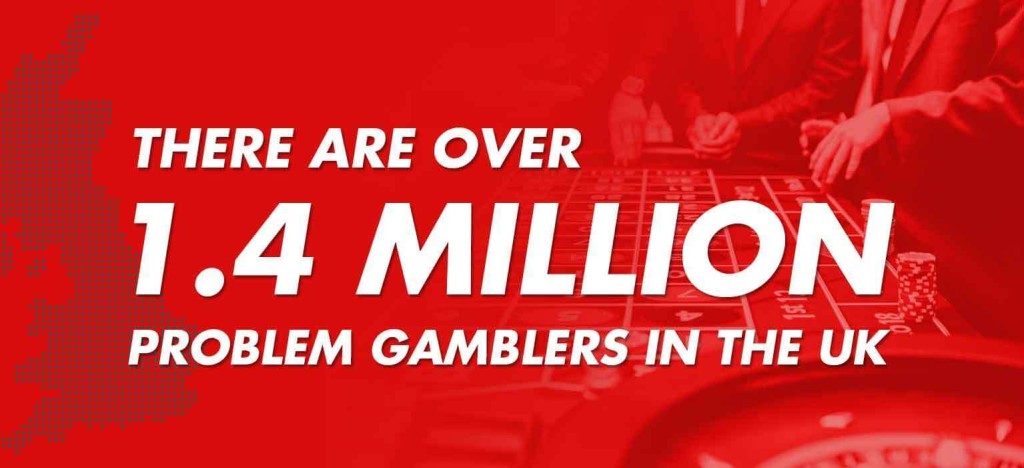
7. How many problem gamblers are in England?
(The Guardian)
A YouGov survey, however, estimates that there could be 1.4 million problem gamblers across the country. In addition to losing money, over a quarter of those seeking treatment reported that they had lost their relationship and another 12% their job because of gambling.
Gambling addiction statistics in the UK also suggest that it’s not just bettors who suffer from their habit. 13% of people seeking help for gambling-related problems are not gamblers themselves, but rather people who have been harmed by someone else’s gambling addiction.
8. 0.4% of problem gamblers were younger individuals aged 16-24.
(Statista)
A survey on problem gambling in the UK reports that the largest share of gambling addicts are between the ages of 35 to 44. By contrast, no individuals over 65 years had a gambling addiction.
9. 37% of children aged 11-16 gambled in England and Scotland during 2020.
(Gambling Commission)
The UK Gambling Commission conducted a survey on underage gambling and found that 1.9% of 11-16-year-olds are problem gamblers.
Furthermore, Gambling Commission statistics report that half of the individuals of this age group have gambled at some point, 51% of whom had a parent or a guardian present the last time they gambled.
You may also be interested in:
10. How many gambling addicts get help?
(The Guardian)
According to a study from the National Gambling Treatment Service, only 3% of gambling addicts seek out for help.
11. Credit Card gamblers are more highly engaged with gambling.
(UK Gambling Commission)
This study was done in 2019 to assist the Commission with its consultation on gambling using credit cards. However, the Gambling Commission announced a ban on credit card gambling in January 2020, which took effect on April 14th of the same year. That said, the UKGC stats showed the following:
- More likely to have a lower ‘gambling literacy score’ (GLS).
- Reasonably likely to have borrowed money from a source other than credit cards.
- More likely to consider gambling management strategies in recognition of gambling risks.
- More likely to use their own funds or stop gambling in the event of a ban on gambling with credit cards.
12. The overall problem gambling rate was 0.3% in December 2021, compared to 0.3% in FY 2020.
(UK Gambling Commission)
At a 0.8% and 1.9% chance of being infected, the moderate risk and low-risk rates are also statistically constant (0.8% and 1.9%) according to the UK Gambling Commission statistics in 2022.
Following two years of steady improvement, problem gambling and at-risk behaviours began to stabilize in 2021.
You might also like: Gods of Gambling in different religions
Gambling Industry Statistics
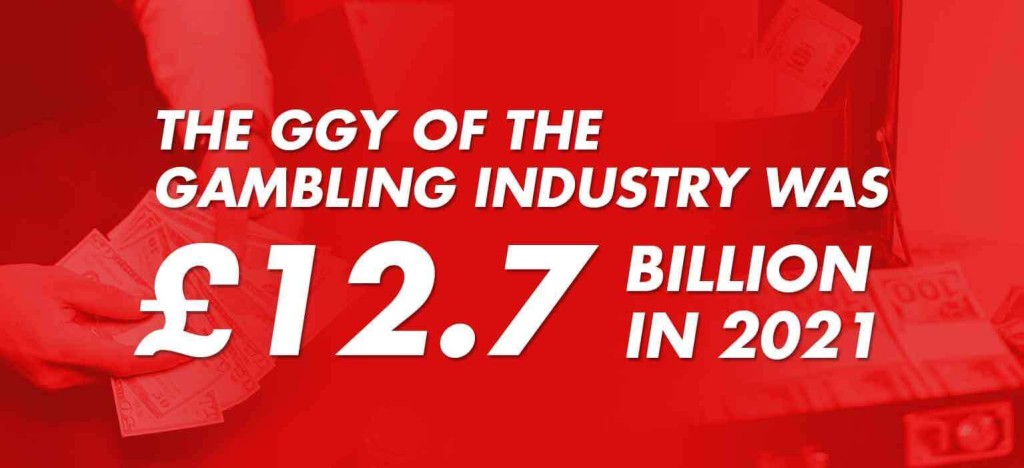
13. Great Britain’s total GGY decreased by 11% in 2021.
(Gambling Commission)
Althouth the total gross gambling yield of the UK decreased by 11% it was still at £12.7 billion in 2021.
14. In 2021 total number of betting shops in the UK was at 6,462.
(Gambling Commission)
According to the gambling commission there were over 6.400 betting shops in the UK in 2021, which was a 15.9% decrease compared to 2020.
15. There were over 8.500 gambling premises in the UK in 2021.
(Gambling Commission)
Simillar to the betting shops, gambling premises also decreased by 14.8% and in 2021 there were only 8.625.
16. GGY reached £1.2bn in the third quarter of 2021.
(UK Gambling Commission)
According to the latest gambling stats in the UK, in the third quarter of 2021, the GGY reached £1.2, which was a decrease of 6% compared to Q2.
17. The number of gaming machines in Great Britain increased by 6% in 2020.
(Statista) (Gambling Commission)
From April 2019 to March 2020, there were 191,826 gaming machines in Great Britain. The number has been steadily growing over the last decade, with only a minimal decrease being recorded in the timeframe from April 2017 through March 2018.
Despite the growth in the number of gaming machines, revenue went down by almost a quarter (25.6%) to £2.1 billion in the same period.
18. 85% of consumers have seen gambling advertisements or sponsorships in 2020.
(Gambling Commission)
The majority of the respondents in the Gambling Commission’s 2020 survey (76%) stated that they saw gambling ads on the telly.
Intriguingly, 41% heard adverts on the radio, while 37% of participants received advertisements via email or texts, making this the least used channel.
Online Gambling Statistics in the UK

19. 32.8% of Brits aged 45-54 gambled online in September 2021.
(Statista)
Surprisingly the age group that gambled the least online during this period were Brits aged between 16-24.
However, there was a 5% rise in people aged from 55-64 that were part in some sort of gambling online.
20. Online casino games dominate the RCBB sector.
(Gambling Commission)
The online casino sector GGY for 2021 was £4.0 billion, from which slot games were responsible for £2.9 billion of the GGY.
In comparison, remote betting GGY was at £2.6 billion and the GGY from bingo was at £189.1 million.
Related: The importance of cybersecurity at online casinos
21. The online gambling sector gathered revenue of £6.9 billion in 2021.
(Gambling Commission)
The GGY of the RCBB (remote casino, betting and bingo) tottalled at £6.9 billion in 2021, which was a 18.4% increase when compared to 2020.
22. Online bettors owned an average of three accounts in 2020.
(Gambling Commission)
Looking back at the past couple of years, the average number of online gambling accounts settled at around three per person. Nevertheless, the number slightly increased in 2020 with 3.2 accounts per person, as opposed to the average of 2.7 accounts in 2018.
Online gambling industry statistics suggest men are more likely to have accounts, holding an average of 3.6. On the other hand, women own a mean of 2.8 accounts.
23. The majority of people participated in online gambling from home in 2020.
(Gambling Commission)
96% of British citizens took part in remote gambling from their homes, just 1% more than in 2019.
Even though the home remains the most common location for gambling online, 8% still stated they gambled at a pub or a club. On top of that, 15% gambled at work in 2019, or 4% more than in 2020.
24. 50% of online gamblers access UK gambling sites via smartphone.
(Gambling Commission)
Unsurprisingly, smartphone use is most favoured by younger Brits aged 18-34 (over three quarters as opposed to just 14% of those 65 and over).
Laptops are the second favourite for using UK gambling sites, with 40% of gamblers using them for remote gambling.
Smart TVs are the least widespread method of online gambling, used by only 3% of gamblers. Yet, the use of smart TVs grew impressively among the younger generation between 18-24, doubling (from 5% to 10%) between 2019 and 2020.
UK Gambles On Sports Too

25. 26.9% of UK citizens bet once a week.
(Statista)
Betting seems to be a favourite pastime for Brits as a third of them place wagers at least once a week, a survey by Statista on UK betting frequency reveals.
What’s more, an almost equally large share of 21.2% bet more than two days a week. Finally, only 33.8% of respondents stated they place bets less than once a month.
26. How many people in the UK bet on sports?
(Statista)
12.93% of people in the UK regularly bet on sports. A much larger percentage (45.33%) only placed wagers from time to time, while 41.73% admitted that they had never participated in sports betting.
Despite the lower number of regular players, UK sports betting statistics and surveys indicate that almost 6% of Brits had wagered on sports events at least once a month.
27. The non-remote betting Gross Gambling Yield was the third largest sector by GGY.
(Gambling Commission)
With £1.0 billion GGY, the non-remote betting sector waw the third largest sector by GGY in 2021.
Althouth, it was the third largest sector it still recorded a 57.1% decrease compared to 2020.
28. 46.7% of the total amount spent on betting in the UK was on football.
(Business First Online)
Football was by far the most popular sport to bet on in 2019, accounting for almost half of the money spent on betting.
Other sports Brits enjoy placing money on include horse races (23.7% of all money spent), tennis (5.9%), and other sports that make up 10.6% of the total spendings.
29. The non-remote betting sector’s gross gambling yield fell to £2.4 billion in 2020.
(Statista) (Gambling Commission)
Ever since reaching its peak in 2016, the gross gambling yield of the non-remote betting industry has been moving downwards to a record-low of £629.3 million between April and September of last year.
30. In 2020, the annual dog race betting turnover stood at £987.87 million.
(Statista)
After a slight decline in the period between April 2018 and March 2019 when it reached £941.66, the yearly dog race betting turnover rose by 5% between April 2019 and March 2020.
31. The overall number of total bets/spins increased by 4% in 2021.
(UK Gambling Commission)
Between Q2 and Q3, the overall number of bets/spins increased 4%, while active players remained constant. Additionally, GGY’s real event betting fell 16% between Q2 and Q3, to just under £461 million.
32. The number of bets placed increased to 28 million in December 2021.
(UK Gambling Commission)
According to the latest gambling trends in 2021, the number of bets made increased by 20% from Q2 to 28m, while GGY rose by 7% to almost £83m during the same time.
Stats on Other Types of Gambling in the UK
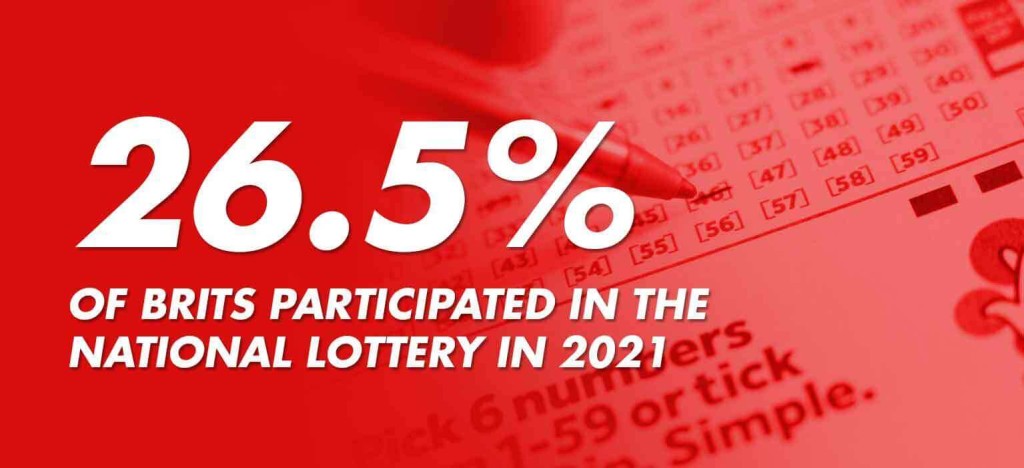
33. National Lottery ticket sales totalled £8.4 billion in 2021.
(UK Gambling Commission)
Out of the total £8.4 billion in ticket sales, £4.9 billion was returned as prizes. This report was made from April 2020 to March 2021, and in that period £1.7 billion of the ticket sales went to good causes.
34. Other lotteries ticket sales totalled £871.7 million.
(UK Gambling Commission)
Other lotteries ticket sales totalled over £870 million, from which over £236 million were returned as prizes.
However, £401.9 million were donated to good causes, which was the biggest donation to this date.
35. 26.5% of Brits participated in the national lottery in 2021.
(Statista) (UK Gambling Commission)
The majority of British citizens seem to favour the national lottery, making it the most popular gambling activity across the country. Right behind it are other lotteries and scratchcards, played by 12.8% and 7.2% of the population, respectively.
However, the updated statistics in the UK for 2022 show us that although participation in National Lottery draws has remained consistent (compared to the year to Dec 2020), there has been a significant decrease in those playing National Lottery branded scratchcards, which is part of a longer-term decline in interest for this product.
Similar: Biggest Lottery losers
36. More women tend to play the Lottery.
(UK Gambling Commission)
The latest Gambling statistics in the UK in 2022 show that females tend to play the National Lottery more than males.
Also, the Lottery is preferred by older players, especially those 55+, and players tend to be from lower-income households, pension or benefit dependent.
37. The eSports market grew 8.5% from 2016 to 2019.
(Gambling Commission)
According to the latest UK gaming industry statistics, 9% of British adults have taken part in eSports betting. This is a solid 6% rise from 2019. It is the younger players aged 18-34 who are fueling the industry’s expansion as a fifth of them stated they bet on eSports.
These gaming statistics also point out that 36% of males of the 18 to 24 generation participated in eSports betting.
UK Casino Statistics

38. The GGY for Casino, remote betting and bingo reached almost 50 million in June 2022.
(Gambling Commission)
According to the latest Gambling Commission statistics, in June 2022, the other gaming and casino sector had a GGY of £49,073,411, which was a 1% drop compared to Q4 in 2021.
39. The average slot session lasts 17 minutes.
(Gambling Commission)
In June 2022, the total number of slots sessions was 41,200,102, and the average number of a session lasted 17 minutes.
Furthermore, over 2,600,000 sessions lasted over an hour.
40. The casino win value of blackjack was £10.04 million in 2021.
(Statista)
In comparison, the drop value was about £39.39 million, which is a significant drop compared to 2020.
41. Slots GGY increased by 1% in 2021.
(UK Gambling Commission)
After reaching nearly £562m in Q2, the slots GGY increased just above £568 million between Q2 and Q3. The number of spins increased 3% to 18.2 billion, while the number of active players increased 5% to 9 million.
42. Machines GGY increased by 3% in Q3 in 2021.
(UK Gambling Commission)
Gambling statistics in the UK in 2021 show us that GGY increased by 3% in Q3 to just over £284m, with spend per session remaining at £11.58 per session. Moreover, In the third quarter, the number of spins on each machine session increased by three to 128 spins.
However, only 3% of the total machines sessions lasted more than an hour.
Self-Exclusion Statistics

43. Only 6% of gamblers decide to self-exclude from gambling.
(UK Gambling Commission)
Althouth only 6% of gamblers self-excluded in 2021, the worrying fact is that 34% of them are aware of self-exclusion but have not decided to self-exclud yet.
While 50% of gamblers are not aware of self-exclusion.
44. Males are more likely to self-exclude.
(UK Gambling Commission)
In 2021, 8% of males self-excluded, compared to the 4% of females.
Furthermore, gamblers aged 25 to 34 are the ones that had the most self-exclusion in 2021 with 13%.
45. To control the amount they are gambling – is the main reason for self-exclusions.
(UK Gambling Commission)
Almost half (49%) of the respondents in the UKGC survey said the main reason for self-excluding was in order to remain in control of the amount they are gambling.
Closing the accoung with a certain operator for marketing purposes (37%) was another reason why gamblers self-exculuded.
46. A 21% increase in new exclusions was recorded in February 2021.
(The Guardian)
The number of gamblers who have signed up for self-exclusion reached an all-time high on 22 February when GAMSTOP saw 326 new registrations in just one day.
According to data from the national self-exclusion scheme, younger people are more likely to self-exclude themselves from gambling—59% of all registrants with the service belong to that age bracket.
47. 2021 is the first year where there is a switch towards more positive perceptions of gambling.
(UK Gambling Commission)
The proportion of gamblers who believe that gambling is conducted fairly and can be trusted has increased from 32% to 36% over the previous year, according to a poll conducted by the UKGC.
48. 70% of Brits think that gambling is dangerous for “family life”.
(UK Gambling Commission)
According to a survey by the UK’s Gambling Commission, 70% of respondents agreed that gambling is dangerous for family life and 59% said that gambling should be discouraged, which in both cases the numbers are significantly lower when compared to the gambling statistics the previous year.
Tapping Out
Despite economic recessions, pandemics and crypto-currency volatility, gambling statistics from the UK show a thriving industry that continues to bring in billions in gross gambling yields and effortlessly attract new clients.
The ability to adapt to new conditions and demands, combined with the thrill of the experience and the chance to win big, are just some of the things that have ensured the prosperity of the gambling business for years and will continue to do so in the future.
You may also be interested in:
Sources:
- Beating Betting
- Business First Online
- European Business Review
- Gambling Commission
- Gambling Commission
- Gambling Commission
- Gambling Commission
- Gambling Commission
- Gambling Commission
- Gambling Commission
- UK Gambling Commission
- UK Gambling Commission
- UK Gambling Commission
- UK Gambling Commission
- UK Gambling Commission
- UK Gambling Commission
- UK Gambling Commission
- UK Gambling Commission
- UK Gambling Commission
- UK Gambling Commission
- UK Gambling Commission
- UK Gambling Commission
- UK Gambling Commission
- Statista
- Statista
- Statista
- Statista
- Statista
- Statista
- Statista
- Statista
- Statista
- Statista
- Statista
- Statista
- Statista
- Statista
- The Guardian
- The Guardian

